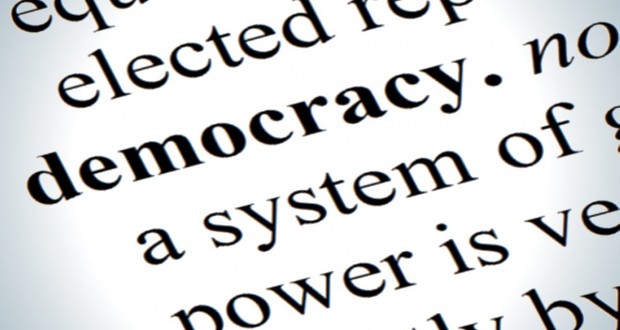 Christel Hahn is a Physicist specialized in biophysics and IT developer. She’s also the President of our International Council of Political Anticipation: IRPA
Christel Hahn is a Physicist specialized in biophysics and IT developer. She’s also the President of our International Council of Political Anticipation: IRPA
The current political parties belong to the nation-state and the citizens are creating new ways to organize themselves
The current democratic system is in a crisis with growing incoherence of society, rise of anti-establishment movements and parties and inability of the European political system to cope with the current multifaceted European crisis. Yet 99% want a stable and supporting environment to live in. This series looks at how our societies will organize themselves in this situation. The first paper looks at the role and future of political parties.
Political parties developed with the European nation-states
Political parties are the product of the introduction of parliamentarism, of the sharing of power between the monarchs, the aristocracy, the upcoming citizens’ and later labor movements. They first developed in England of the 17th century as loose and changing associations and clubs: the famous Whigs (liberals) and Tories (conservatives), which in the course of the 19th century were replaced by Tories and Labor. The first “modern” party came out of the Irish Parliamentary Party of Charles Stewart Parnell, who developed a more closed organization with fixed membership and discipline.
In all other European or europeanized countries a specific, on the one hand similar, but on the other hand distinct development took place according to the specific history of these countries (French revolution, German revolution, etc.). With the industrial revolution in the 19th century we see the development of marxist and social-democratic mass parties in all industrializing countries. Yet very different party-systems developed in different countries depending on the legal framework concerning election laws, constitutional type of the state, financing of parties and also depending on the acuteness of certain unresolved conflicts (like independence movements and ethnic/religious conflicts). The main difference being, to what degree and how transparent parties are financed by special interest groups and whether it is a bi-partisan (like in the US) or a multi-partisan (leading usually to coalition governments) system.
Among the US founding fathers were non-partisan ideas[1] and the 19th century German Reich saw the state as superior to political parties[2], yet political parties are by now inherent elements of western democracies. In the german post-war constitution political parties have even been incorporated into the constitutional system. As the european system of parliamentary democracy has spread around the globe, especially after the second world war and the end of colonialism, political parties are now existing everywhere. Yet the continued one-party democracy in China not only is a product of its communist past, but also of the distinctly different eastern tradition, which is more based on reaching consensus than on celebrating political fights.[3] This trait of governing through consensus we can also observe in the Japanese society[4].
In whose interest?
Although the german post-war constitution[5] sees political parties as an expression of the common interest, political parties have historically developed as associations for the representation of specific interests of certain factions of the population, like aristocracy, bourgeoisie, workers, the financial elite, certain industries, religious groups, ethnic groups or even more restricted factions[6]. In the course of this development also powerful ideologies (marxism, fascism, neo-liberalism, …) have emerged.
Nourished by these factions we see the development of clubs or networks of activists, leaders and supporters. These networks also attract individuals, who seek power, so political parties can also be seen as networks of people wanting to rise to power.
Because up to now the democratic process is highly dependent on the availability of large sums of money[7], these factions use big money to reach their political goals and in most western countries political parties are needed to collect and access money (membership fees, donations, party financing through the state). Seen from this perspective one can say, that the western financial elites need certain environments under certain circumstances and use their financial means to empower the most suitable political parties.
In the european nation-states the old ways, how to manage politics don’t work any more
The scene of political parties of the last decades of most european states was dominated by a few big parties: conservatives, social democrats and to a lesser degree liberals. In most countries this has now changed and the way citizens try to influence politics is changing.
The world of work has dramatically changed, but the traditional labor movement has not really re-invented itself and adapted to this change, so the socialist parties loose voters everywhere. Likewise the churches have lost their former hold on the political orientation of people, so the christian conservatives also loose voters, … Also through these changes the traditional left-right-divide of political parties is more and more becoming obsolete[8].
Change has also come from the political evolution of the continent: the student revolts (May 1968) in France and other european countries led to new movements like the environmental movement; the end of the authoritarian regimes in Spain, Portugal and Greece in the seventies and the end of the Warshaw Pact at the beginning of the nineties saw the development of new democracies with new dynamics.
So many countries of the old europe renewed itself through new political parties: in Germany the Greens, Linke and the AfD; in France the Front National; in Italy the 5 Star Movement; in GB the UKIP; in Spain Podemos and Ciudadanos; in Greece Syriza, in Switzerland Operation Libero[9], … and in eastern europe the party spectrum was anyhow different from its very start.
Through all this the traditional ways, how to manage politics and how to form predictable governments[10] don’t work any more[11], and we should think of new elements of the political systems to reflect and incorporate this changed state of affairs. This could for example mean, that general programs of political parties[12] loose their importance and are replaced by democratizing the actual decision-making by involving more stakeholders, organizations and citizens. Or it could mean to replace coalitions by voting in parliament for the heads (and the programs) of all the ministries. ….[13] [14]
At the european level: network of political parties of the european nation-states
At the European level we have a very special situation, which reflects the suppressed and incomplete political integration of the EU and its lack of democratization. The political parties of the European nation-states, which of course don’t want to loose their positions, financing and influence, are one of the main forces (next to the Anglo-Saxon imperialists[15], the ruling elites of the European nation-states and a big part of the EU technocracy[16]), who have hindered and sabotaged this political integration and democratization.
So at the European level we have in essence no real trans-european political parties, but associations of political parties of the nation-states, like the EPP or the PES[17]. Newropeans, the model of the trans-european political party with no national level[18], that has been created by Franck Biancheri, is today still a singular model[19].
The emergence of the Euro-citizen
Yet it is also useful to have a look at European society and check, what kind of trans-european groupings and networks have developed or which sections of society are involved and what kind of structures they use to influence politics.
Since Europe exists there was migration[20], especially labor migration. After the second world war there have been several waves of migration, like the massive re-settlement of germans from the east, the migration from the ex-colonies (like from the Commonwealth and from the french ex-colonies), the labor migration from the south, the migration of germans out of the former soviet union, the labor migration from the east after the fall of the wall, … . Yet the labor movement, although traditionally interconnected on the european and international level, is basically national[21]. The majority of those migrants have either integrated (and if oriented towards politics entered a existing union or national party) or formed their own parallel societies and the organizations evolving out of these are to a large extend radically anti-western (like the salafist organizations). So european societies have been shaped, changed and polarized by this migration, but no “migrant” political parties have evolved[22] [23].
A large segment of the business world is active on the european or international level. Managers of the big internationals and the finance world can even be seen as a global community. A similar statement can be made for the academic world, where a very strong european momentum was created through the ERASMUS Programme[24] with 2 million university graduates with a trans-european experience[25] (which now also has a global orientation through the integration of ERASMUS MUNDUS).
So its the business and the academic world, that has really expanded beyond the nation-state, but apart from their professional organizations and their Brussels lobby groups we don’t see the development of political parties as means to influence the european level.
At the supra-national level: politics beyond national competition
Yet another trend also needs to be looked at. The european political system does not only reflect the fact, that a number of vital political debates (like the debate about european independence and Europe’s role in the world) are suppressed, but also the specific needs of a supra-national political system. At the supra-national level the very foundation of quite a number of political fields is not existing any more: the national competition or the national egoism.
So politics works differently at the supra-national level and the fact that in the European parliament the majority of decisions are done by a “grand coalition” of the big parties is not only an expression of the lack of trans-european political debate on vital european questions, but also of the way politics works at the supra-national level: its main task is to manage the living conditions of the people. So political parties, who are tied to certain factions of the population or to certain outdated ideologies, do not really further the process of managing and improving the living conditions of the 500 million Europeans. By this we can clearly see, that the traditional european parties are products of the european nation-states and will be replaced by new forms. Also the fact, that governance is becoming very technocratic on the supra-national level is not in itself harmful, but the problem is, how to democratically anchor such a technocratic system of governance.
In addition we need to see, that the world of governance (and especially the trans-national governance) is much more complex in the 21st century, than it was in the 17th or 19th century. So experts, counselors, lobbyists and technocrats do today play a decisive role in the process of governance. Again this opens the question on how to democratize a technocratic governance. On the other hand it is now much more easy for citizens to organize themselves[26] and they are doing it every day on the social networks. The way citizens connect through social networks has for sure changed their ideas and behavior dramatically and is now giving birth to new political movements[27] and new forms of governance: crowd intelligence[28] and crowd governance are emerging terms.
Outside the traditional political parties we can see an accelerated interconnectedness on the european and global level: Attac, Democracy International (founded in 2011), Stop TTIP (with a huge network of civil society organizations) are a few recent examples and very recently the creation by Varoufakis and others of “Democracy in Europe Movement 2025” DIEM25, a movement of a very new type, yet anchored in the left movement.
In the current transition period, LEAP (Laboratoire Européen d’Anticipation Politique) has started a project, the Euroland Agora, to focus and crystallize these developments: a platform, political, but not ideological, with the aim to create the foundations for a democratic and political governance of that part of the EU, that has opted for a political integration, the Eurozone or the Euroland.
[2] For Hegel a party is a special, incidental interest („des besonderen, zufälligen Interesses“). Source: Zeno
[3] In this very interesting interview Solschenizyn looks back at the roots of the Russian revolution, criticizes Gorbatchev and Jelzin, explains Putin and pleas for an alive democracy, yet he explicitly favors a nonpartisan democracy. Source: Spiegel International 23/7/2007
[4] … and in the Swiss way of forming all-party-governments.
[6] For example the pirates gather more or less people interested in the management of the internet.
[7] See for example: The Economist 9/2/2014
[8] Like the Front National unites in its program nationalistic and etatistic positions. Another example is the “socialdemocratization” of the CDU by Angela Merkel, who started her political career in the east german citizens movement, see also: Rosenheim24, 22/6/2015 (“Die CDU hat sich auf lange Sicht Merkel angepasst – nicht umgekehrt.” The CDU has adapted in the long run to Merkel, not the other way round.)
[9] Over the last years the SVP has sabotaged the swiss “consensus system” by imposing its will through popular referenda. Now this was stopped by a citizens’ platform Operation libero, founded by the daughter of a liberal politician, who did not want to join the old liberal party.
[10] Even the unstable italian situation can be called “stable” from a certain angle. In this Wikipedia article it is argued, that in spite of many governments, there was always a personal continuity: 63 governments, but only 27 prime minsters: Wikipedia
[11] Due to this evolution now in Germany, which has seen very stable governments during all these years and where, in times of difficulties, a grand coalition of conservatives and social democrats served as the means for a stable government, now for the first time it seems, that after the elections in Baden-Württemberg and Sachsen-Anhalt it will not be possible any more to form such a grand coalition. See: Spiegel 26/2/2016
[12] If coalition governments are formed these programs, on which parties have campaigned, are anyhow overwritten by coalition agreements. Like Kretschmann won his last elections by opposing Stuttgart21 and then signed an agreement with the SPD to support it.
[13] These points should be developed in further papers of the series “Inventing 21century democracy”.
[14] Here a very interesting approach by the german philosopher Johannes Heinrichs: Four-way-path-model
[15] Divide et impara (divide and conquer)
[16] And the European citizens, who know political life only from the perspective of the European nation-states, for a long time did not understand, that democracy at the European level is in their own interest.
[17] Through the treaties of Maastricht and Amsterdam (financing) European political parties have been introduced and as a consequence a number of party-associations registered as European parties, yet they still are basically networks of political parties of the nation-states, although their Europe headquarters have started to develop their own activities. Source: Wikipedia.
[18] See for example: cyberdémocratie 3/10/2005
[19] There are a few other small European parties, which are no associations of parties, but those have not adopted the no-national-level-modell (like Libertas, European Federalists).
[20] One of the origins of the current Europe is the Great Migration.
[21] So the “international proletariat” has always been a marxist illusion.
[22] The european green parties today not only represent demands of the environmentalists, but also of other ill-represented groups like women, homosexuals or migrants and have developed an ideology of multiculturalism.
[23] Recently, for the first time, the germans, that have emigrated from the ex-Soviet Union, have articulated themselves politically through the organization (via facebook) of a series of manifestations because of the alleged abuse of a girl by recent migrants.
[24] See video: ERASMUS: When citzens build Europe
[26] So they don’t need the old clubs any more.
[27] The latest of these, the above mentioned Operation Libero in Switzerland.
[28] An interesting example of crowd intelligence is the movement against Stuttgart21, see for example: WikiReal:Stuttgart21 and WikiReal:Expertenrat


 LEAP2040 Toutes les informations et archives Europe2040
LEAP2040 Toutes les informations et archives Europe2040



